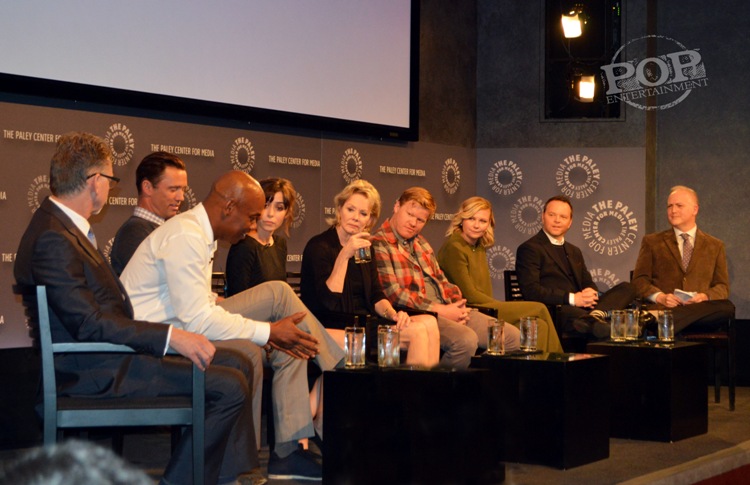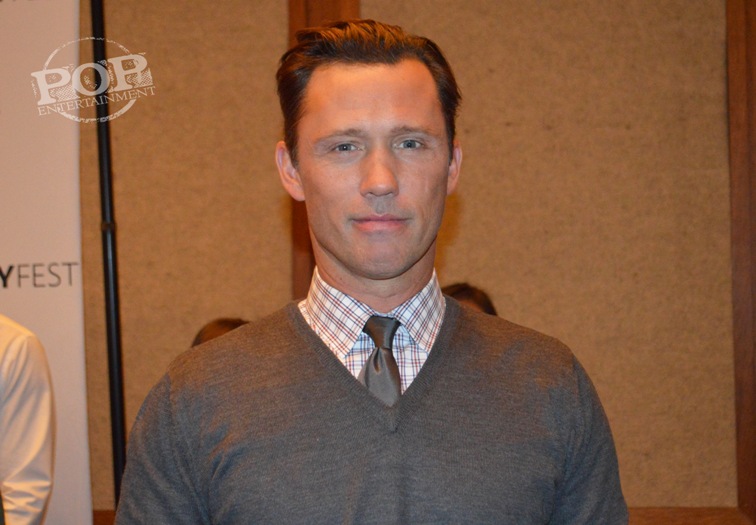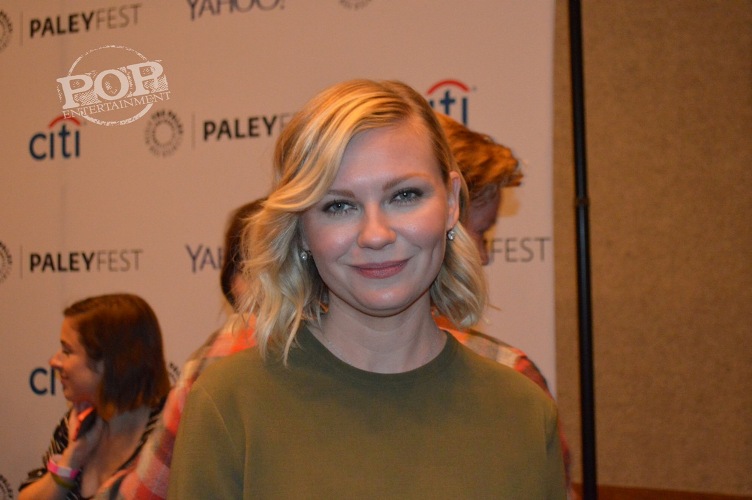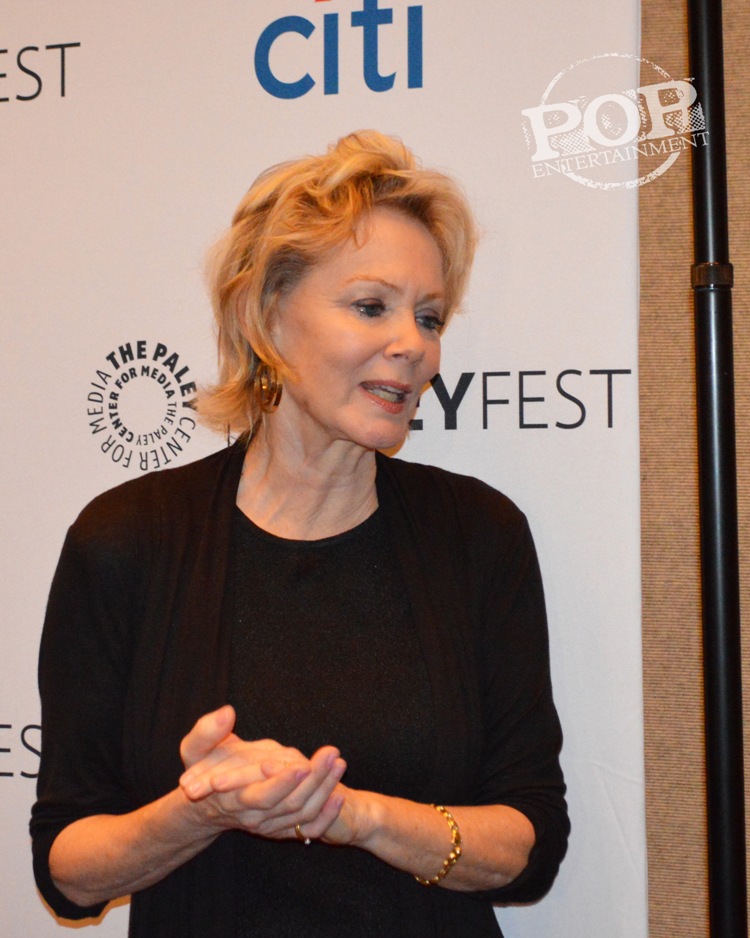Whatcha sayiní?
Fargoís cominí back?
Oh, ya. The second
season is startiní out real good.
There are few stories
in history that seemed less likely (and frankly more impossible) to
revisit than Joel and Ethan Coenís classic 1996 film Fargo. The
wonderfully quirky crime comedy drama about low crimes, high passion,
"Minnesota nice" manners and general incompetence in the American tundra
won Oscar gold (Best Screenplay and Best Actress) for its off-the-wall
mixture of the surreal and the mundane.
The film starred
William H. Macy as a cuckolded Wisconsin car dealer who hatches a
lame-brained plot to have his wife kidnapped for ransom, Steve Buscemi
and Peter Stormare as the squabbling punks who pull off the caper and
Frances McDormand as the decent and hugely-pregnant sheriff who cleans
up the bloody aftermath.
It seemed almost
crazy when FX picked up the title to turn into a TV series. And it may
have been, had they not found the perfect steward in show-runner Noah
Hawley. In fact, when FX took the Coens the pilot script which Hawley
had created, the famously prickly brothers allowed that they were no
fans of imitations, but that Hawley had completely captured their
world. Therefore the Coens signed off on the show, giving their
blessing and complete creative control to Hawley.
Hawley took the ball
and ran with it. The first season of Fargo was a popular and
critical success. The oddball story of a loser travel agent (Martin
Freeman) and a remorseless hit man (Billy Bob Thornton) whose chance
meeting in a hospital waiting room leads to a trail of bodies. In the
meantime, the local small-town cops (Bob Odenkirk, Colin Hanks and a
breakout performance by Allison Tolman) try to curb the sudden crime
wave.
 It
was a terrific story, Emmy award winning and popular. However, it was a
finished story. All of the ducks had been put in a row, the bad guys
had been vanquished and the heroic cops found true love. Where could
Fargo take the story from there? (Maybe even to the title city?
For the record, the film did not take place in Fargo, North Dakota Ė
except for one scene early on Ė and the series does not either, though
the city does have glancing connections to the action.)
It
was a terrific story, Emmy award winning and popular. However, it was a
finished story. All of the ducks had been put in a row, the bad guys
had been vanquished and the heroic cops found true love. Where could
Fargo take the story from there? (Maybe even to the title city?
For the record, the film did not take place in Fargo, North Dakota Ė
except for one scene early on Ė and the series does not either, though
the city does have glancing connections to the action.)
Turns out that
Fargo is not even trying to continue the first season storyline.
Other than the basic setting, quirky vibe, and a couple (so far) of
recurring characters, the second season is completely separate from the
first go-around. Much like American Horror Story, the series is
doing a pretty much complete reboot, starting off with a fresh and
different plotline and characters. It is similar in feel to the last
season, but at the same time, totally different.
Season two is a
period piece, going back to the polyester-wearing, big-hairdoed world of
1979. Back to the days of gas embargos, Three Mile Island, Superman,
Iranian hostages, paisley shirts with big collars and the last days of
disco.
Executive producer
Warren Littlefield, the former head of programming for NBC (Bob Balaban
played a funny, fictionalized version of him in several episodes of
Seinfeld) loves the changes that Fargo has come up with for
the second season.
"This year, our
thematic is quite different," Littlefield explained to me before a
recent PaleyFest event celebrating the new season in New York. "Itís
1979 and we really played along in holding up a mirror to what was going
on in America at the time. The thematic is the Walmart-ization of
America, big business gobbling up mom and pop businesses. In our world,
that means the Kansas City crime syndicate is going to do a hostile
takeover of the Gerhardt crime family. They resist. Stuck in the
middle: Ed and Peggy Blomquist, hairdresser and butcher. And a war
erupts. We think weíve enveloped a lot of what was going on in the
country at the time. We love that the DNA I think can be true to the
Coensí vision. But only part. Itís a different story, different time
period, and yet itís still Fargo."
"I just think there
is nothing like it on television," agreed actress Cristin Milioti, who
plays the cancer-stricken wife of the local state police chief, played
by Patrick Wilson. "Thereís nothing like it. Itís so remarkably
unique. It honors that dark and weird world of the Coen Brothersí
Fargo, while remaining its own entity, which is so hard to do."
Of course, being
Fargo, itís got its own little oddball twists and turns, like UFOs
and a supporting role of an visiting, eccentric soon-to-be-President
Ronald Reagan (played by cult-fave Bruce Campbell).
 Campbellís
old Burn Notice co-star Jeffrey Donovan has the more significant
role as the oldest son of the Gerhardt family. Donovan is also
intrigued by the seriesí new direction. "Noah wanted to tap into the
late seventies, which is like you say about the Walmart-ization of the
mom and pop shops. This year to an extent flows on íwell, letís look at
gangs.í Letís look at the mob, the mom and pops, just like any other
corporation. I thought that was fascinating."
Campbellís
old Burn Notice co-star Jeffrey Donovan has the more significant
role as the oldest son of the Gerhardt family. Donovan is also
intrigued by the seriesí new direction. "Noah wanted to tap into the
late seventies, which is like you say about the Walmart-ization of the
mom and pop shops. This year to an extent flows on íwell, letís look at
gangs.í Letís look at the mob, the mom and pops, just like any other
corporation. I thought that was fascinating."
"Itís a different
story, first of all," agreed Kirsten Dunst, who plays hairdresser Peggy
Blomquist. "It is period. A different cast. It feels like more cast
members almost I think this season. It has a different feel, how they
cut it together. Itís more comedic, I want to say. I feel like itís
more of a comedic tone."
"There is that, and
America as a throwback," Donavan continued. "I donít think guys are
like this anymore, and I donít think they are allowed to exist anymore.
It was an era where you wore the line of the law in the back yard and
you thought it extended outward. So itís a really unique role. Iíve
never played this kind of guy before. And obviously to come off of
Burn Notice and play something like this was very exciting."
It was in the 1970s
that the American dream of building a small business to support your
family, hopefully for generations, started to crumble. Little local
stores and restaurants started getting muscled out by huge chains, who
had the financial means to undercut and outlast their competition.
Things became a little bit more convenient Ė perhaps Ė but personalized
service and a sense of community was stomped into the dust.
"Itís a small-town
look at grand themes," Donovan said. "When you talk about íWalmart-ization,í
what youíre really talking about is: How does one CEO, or the word of
people, decide that the bottom line is the really important thing,
therefore how do we lower our bottom line? The bottom line can be
lowered by sending things overseas. When you walk in the doors of
Walmart, 99% of it is made overseas, where there is very, very cheap
labor. Thereís no atoning for the lives you are destroying when you do
that."
 "The
mom and pop companies [are] going away," Dunst agreed. "I know itís
that way. Even in New York, I was talking to someone today about my
[old favorite] local place, but places like that donít exist anymore.
Itís all Starbucks. Itís just the environment we live in."
"The
mom and pop companies [are] going away," Dunst agreed. "I know itís
that way. Even in New York, I was talking to someone today about my
[old favorite] local place, but places like that donít exist anymore.
Itís all Starbucks. Itís just the environment we live in."
"When you look at
Fargo, I think Brad Garrettís character Bulo, and Bokeem [Woodbine]ís
character of the enforcer, they say itís all about the bottom line,"
Donovan continued. "Itís all that matters. They donít care who dies,
who lives, as long as it makes money. Cold, calculating times, itís a
really interesting thing to display."
Donovanís mother is
played by former Designing Women star Jean Smart. Her husband
has just suffered a debilitating stroke, so now it comes down to mother
to keep the family together against the outer forces that want to
destroy their family business Ė which just happens to be organized
crime.
"Itís fun to play
her," Smart said. "Sheís torn between being a mother protecting her
children Ė sheís already lost at least one Ė and also doing what needs
to be done to keep the business together. Sheís not an easily
intimidated person. Sheís a mother, so... Thatís her weak and her good
spot."
"I think Noah writes
so beautifully for women," Milioti said. "He writes really strong
women. Unfortunately, thatís a bit of a rarity. Not a bit of a rarity,
itís an extreme rarity nowadays."
One of the more
complicated female characters is Peggy, played by Dunst. She seems to
be a sweet, naive and pleasant small town woman Ė fairly happily married
and hoping to eventually open her own hair salon Ė whose life is thrown
into complete chaos after a late night auto accident.
"She has tunnel
vision about going to this seminar," Dunst said. "I think her tunnel
vision about that now becomes this accident that happens. She becomes a
terror within that. Sheís just shifting to something else. In a way it
brings her and Ed together. Itís almost like a love story, in a twisted
way, about how far youíll go for somebody. Theyíre like the uncool
Bonnie and Clyde. Thatís what I think." Dunst laughed.
 Milioti
had previously been the female lead in the popular Broadway musical
Once before making her mark on television as the titular mother on
the last season of the popular sitcom How I Met Your Mother.
She plays a mother also in Fargo, (and like her How I Met
Your Mother character, this mom is also fighting a life-threatening
disease), but otherwise the characters could not be any more different.
Milioti
had previously been the female lead in the popular Broadway musical
Once before making her mark on television as the titular mother on
the last season of the popular sitcom How I Met Your Mother.
She plays a mother also in Fargo, (and like her How I Met
Your Mother character, this mom is also fighting a life-threatening
disease), but otherwise the characters could not be any more different.
"I think there was
way more beneath the surface than you initially meet," Milioti said
about her character. "Sheís very easily written off as a homemaker, and
sheís ill, but thatís the tip of the iceberg. Still waters run very
deep."
In fact, in one of
the little winks at the other Fargo worlds, Miliotiís daughter is
a little girl who will grow up to be the character that Allison Tolman
played in the first season, and her husband is also a significant cog in
the story. The first season also had some little Easter eggs towards
the movie Ė a businessman played by Oliver Platt made his fortune after
finding the money buried in the snow by Steve Buscemi in the film.
Littlefield enjoys
the fact that the show has this tightly interlocked history. "In year
one we certainly gave a nod to the movie," he said. "In year two, we
give a nod to year one. If you remember, Lou Solverson, who was played
by Keith Carradine in year one, is now played in year two by Patrick
Wilson. Heís 35. Heís come back from Vietnam. He thought he left the
madness behind, when in fact itís right at his doorstep. Thatís our
connection to the previous year. We like connectivity, but they also
stand on their own. If youíve never seen the Coensí movie... shame on
you.... But here they donít have to see the movie. They donít have to
see year one. They can just come to it fresh and enjoy our Fargo
world."
Bokeem Woodbine, who
plays an arrestingly friendly hit man targeting the Gerhardt family Ė he
may become the new seasonís breakout character, as quietly unnerving as
Billy Bob Thornton was last year Ė also enjoys the interlocking worlds
of Fargo.
"The mythos of
Fargo," Woodbine mused. "The legacy of Fargo. The
world of Fargo. I believe that we are contributing a very
intrinsic and integral aspect to Fargo. We are going back in
time. We are planting roots and sowing seeds. I almost want to say
that one could watch season two and then watch season one and be
entertained. Or you could watch season two and then watch the movie
Fargo and then watch season one. So I do believe that it is a
necessary part of Fargo in its entirety."
Milioti admitted that
when she worked with Ted Danson (who plays her local-sheriff father in
this season of Fargo) she had somehow never seen anything he had
done before. She was impressed by the guyís work and asked him for his
reel so she could see some more of his work. Danson had to explain to
her that he had once been the star of a popular series called Cheers
and had done dozens of films and series since then.
 Itís
an extremely strong cast, one that is a pleasure to work with says
Smart. "It was great. Of course I didnít get to do scenes with
everybody. There were a lot of actors I never saw except in passing
sometimes in the make-up trailer. íHi! How are you doing?í But, it
was incredible. Thereís a really amazing cast."
Itís
an extremely strong cast, one that is a pleasure to work with says
Smart. "It was great. Of course I didnít get to do scenes with
everybody. There were a lot of actors I never saw except in passing
sometimes in the make-up trailer. íHi! How are you doing?í But, it
was incredible. Thereís a really amazing cast."
That amazing cast
gets repaid by getting the opportunity to act at the offbeat pace of
Fargo. The show has a very quiet, polite, almost mundane
conversational vibe Ė everyday people speaking smartly but normally Ė
which is suddenly interrupted by extreme acts of violence or off-kilter
plot developments.
Woodbine loves the
dichotomy of this. "Oh, itís amazing how much pleasure you can get from
interjecting the absurd into the mundane if you will," Woodbine said.
"Because in life, Iím sure you believe, we all have had moments where we
almost feel as though maybe somebody might be filming us. Something so
bizarre will happen, or a sequence of events, you canít believe almost
that youíre actually experiencing something like this. It seems like
itís out of a movie. Iím sure youíve had experiences like that in your
life. I canít believe this is actually happening. This is so weird. I
have as well, had moments like that. Fargo somehow captures
that. They somehow have figured out how to put on film those bizarre
moments. The humor of the gods."
Donovan agreed with
this. "Itís fun to play in any world where authenticity is rule one,"
Donavan said. "Then if you can find darkness and humor, and youíre
still in the same scene, thatís pretty enjoyable as an actor."
Even the women, who
have less of a part in the more shocking moments, enjoy that wild and
unpredictable feeling of volatility.
"Peggy doesnít really
get [too many scenes like that]...," Dunst admitted. "Well, I do, but I
donít really get the major action like that. I do more... well, youíll
see. I get to do some really weird things."
"I donít really have
much of a part in the... well here Iíll say... in some of the violence,"
Milioti allowed. "But itís an amazing line to toe."
"Itís an interesting
tightrope for them to walk," Littlefield agreed. "Because, first and
foremost we are a drama, but also crazy, crazy things happen. As we
unravel them, in the cold of winter in our frozen tundra land, thatís
where real people are. That is sometimes tragic and sometimes very
funny and sometimes both at the same time."
CLICK
HERE TO SEE WHAT JEFFREY DONOVAN HAD TO SAY TO US IN 2010!
CLICK
HERE TO SEE WHAT JEFFREY DONOVAN HAD TO SAY TO US IN 2012!